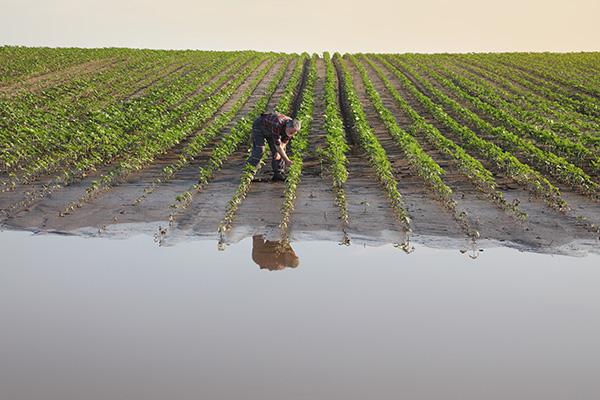
Today, the European Commission published a report on the use of crisis measures taken to support the EU agri-food sector from 1 January 2014 to the end of 2023. The report shows that the legal toolbox for exceptional measures of the Common Organisation of the Markets (CMO), further developed by the last reform of the Common Agricultural Policy (CAP), provides the flexibility for tackling various types of crises. The measures adopted have overall proven to be effective in helping EU farmers and producers to cope with the impact of crises.
Agricultural production is inherently risky since it depends on natural resources and climate conditions, and is influenced by market developments. Adverse weather conditions, severe market imbalances, or the spread of animal diseases and plant pests can lead to harvest failures and other serious market disturbances. Amidst market crises, specific and exceptional public action may be necessary to prevent or mitigate significant damages to producers and disruptions to the food supply chain.
Over the past decade, the EU agricultural sector has faced a multitude of crises, including the effects of COVID-19 pandemic, the war in Ukraine, animal diseases, significant market disturbances and extreme weather events. These have impacted virtually all agricultural sectors, throughout the EU. Such events are often of a multidimensional and unpredictable nature and therefore require ad hoc and targeted responses.
The Commission has always stood ready to assist EU farmers in need within the possibilities of its legal toolbox set by the co-legislators. From 1 January 2014 to the end of 2023, 63 exceptional measures have been adopted by the European Commission to support farmers and producers impacted by loss of production, reduction of prices, higher production costs or supply chain disruption. These measures have channelled more than €2.5 billion of EU funds to EU agricultural sector and demonstrated the constant EU solidarity towards its farmers.
These included, among other measures:
- More than €500 million distributed from 2014 to 2018 to EU producers of fresh fruit and vegetables impacted by the Russian ban on EU imports
- Two support packages in 2015 and 2016 worth in total more than €800 million, and including the setting-up of an EU milk production reduction scheme, to stabilise the dairy market and support farmers’ income in total to weather market disturbances
- Some €450 million for specific measures supporting the wine sector and allowing producers to resort to crisis distillation, among other things to cope with Covid-19 pandemic impacts, trade sanctions and more recent market imbalances
- A support package of €500 million in March 2022 to support the producers most affected by the serious consequences of the war in Ukraine
- €156 million for farmers in Bulgaria, Hungary, Poland, Romania and Slovakia most affected by the increased imports of cereals and oilseeds from Ukraine
- Financial compensation for farmers impacted by the sanitary control and preventive measures to fight avian flu outbreaks
- €330 million in July 2023 for EU farmers from 22 countries suffering from specific problems in different agricultural sectors, such as higher production costs and the impacts of extreme weather events
The exceptional measures have been mainly used to help farmers in relation to the damages they suffered because of market disturbances or issues with animal or plant health. They have also helped farmers to address the negative impacts of extreme adverse weather events on their economic returns. The report also points out that, while exceptional measures are a clear demonstration of EU solidarity, their use should not prevent farmers to manage their own risks, for example by resorting to sustainable agronomic and livestock breeding practices, and adopt appropriate risk-management tools and strategies.
Background
Regulation (EU) No 1308/2013 establishes a Common Organisation of the Markets (CMO) in agricultural products and is the framework for the market measures provided for under the Common Agricultural Policy.
Under Articles 219 to 222, the CMO Regulation provides for exceptional measures to be taken when a crisis, or the threat of a crisis, arises and a specific response is needed to prevent market disturbances, and/or to mitigate their consequences. These provisions allow the Commission to quickly take proportionate action and adopt measures to react to market disturbances (Art. 219); measures to address the market impacts of sanitary measures adopted to avoid the spread of animal diseases and plant pests and/or address a loss of consumer confidence due to public, animal or plant health risks (Art. 220); and measures to resolve specific problems to prevent the deterioration of market conditions (Art. 221). They also allow for agreements and decisions of farmers, their associations, recognised producer organisations and recognised interbranch organisations when markets suffer severe imbalances (Art. 222).
Within the current CAP, in place since 1 January 2023, an agricultural reserve with a yearly allocation of at least €450 million is established to finance these exceptional measures. As part of the current legal provisions, the Commission has to report every three years to the European Parliament and to the Council on the use of the crisis measures adopted on the basis of articles 219 to 222.
Today’s report is the first report complying with this reporting obligation that was introduced with the last CAP reform. It presents the use of these measures from 2014 to end 2023.
Related links
Report on the use of crisis measures adopted pursuant to Articles 219 to 222 of the CMO Regulation
Details
- Publication date
- 23 January 2024
- Author
- Directorate-General for Agriculture and Rural Development
- Location
- Brussels
